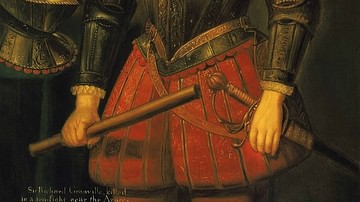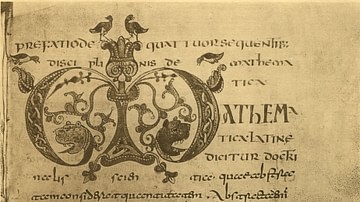Search Definitions
Browse Content (p. 128)

Definition
Richard Grenville
Sir Richard Grenville (1542-1591 CE) was an Elizabethan adventurer, mariner, and privateer whose life story is as entertaining as any fictional sailor. His early career saw him become a Member of Parliament, a soldier in Hungary, and a plantation...

Definition
Arjuna
Arjuna (also given as Arjun) is the great hero of the Indian epic Mahabharata and the philosophical-religious dialogue Bhagavad Gita. His name means “shining”, “silver” and similar terms relating to brightness. He is the most popular champion...

Definition
Martin Frobisher
Sir Martin Frobisher (c. 1535-1594 CE) was an Elizabethan adventurer and explorer who embarked on three expeditions in the 1570s CE to chart the waters of the North American Arctic and find the Northwest Passage to Asia. Unsuccessful in these...

Definition
Bhagavad Gita
The Bhagavad Gita (“Song of God” or “Song of the Lord”) is among the most important religious texts of Hinduism and easily the best known. It has been quoted by writers, poets, scientists, theologians, and philosophers – among others – for...

Definition
Etymologiae
The Etymologiae (Etymologies) is a Latin work by Isidore of Seville (l. c. 560 - 636 CE), compiled in the early 7th century CE and published in its final form shortly after his death. The book is a type of medieval encyclopedia and is a survey...

Definition
Elizabethan Theatre
Elizabethan theatre, sometimes called English Renaissance theatre, refers to that style of performance plays which blossomed during the reign of Elizabeth I of England (r. 1558-1603) and which continued under her Stuart successors. Elizabethan...

Definition
Upanishads
The Upanishads are the philosophical-religious texts of Hinduism (also known as Sanatan Dharma meaning “Eternal Order” or “Eternal Path”) which develop and explain the fundamental tenets of the religion. The name is translated as to “sit...

Definition
William Cecil, Lord Burghley
William Cecil, 1st Baron Burghley (1520-1598 CE) was Elizabeth I of England's most important minister for much of her reign (1558-1603 CE). Lord Burghley was Secretary of State for both Edward VI of England (r. 1547-1553 CE) and Elizabeth...

Definition
The Vedas
The Vedas are the religious texts which inform the religion of Hinduism (also known as Sanatan Dharma meaning “Eternal Order” or “Eternal Path”). The term veda means “knowledge” in that they are thought to contain the fundamental knowledge...

Definition
Robert Dudley, 1st Earl of Leicester
Robert Dudley, 1st Earl of Leicester (l. c. 1532-1588), was a high-ranking courtier who rose to become a favourite of Elizabeth I of England (r. 1558-1603). Rumours abounded that Dudley sought to marry the queen, and their relationship may...